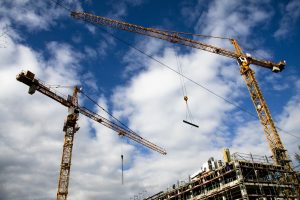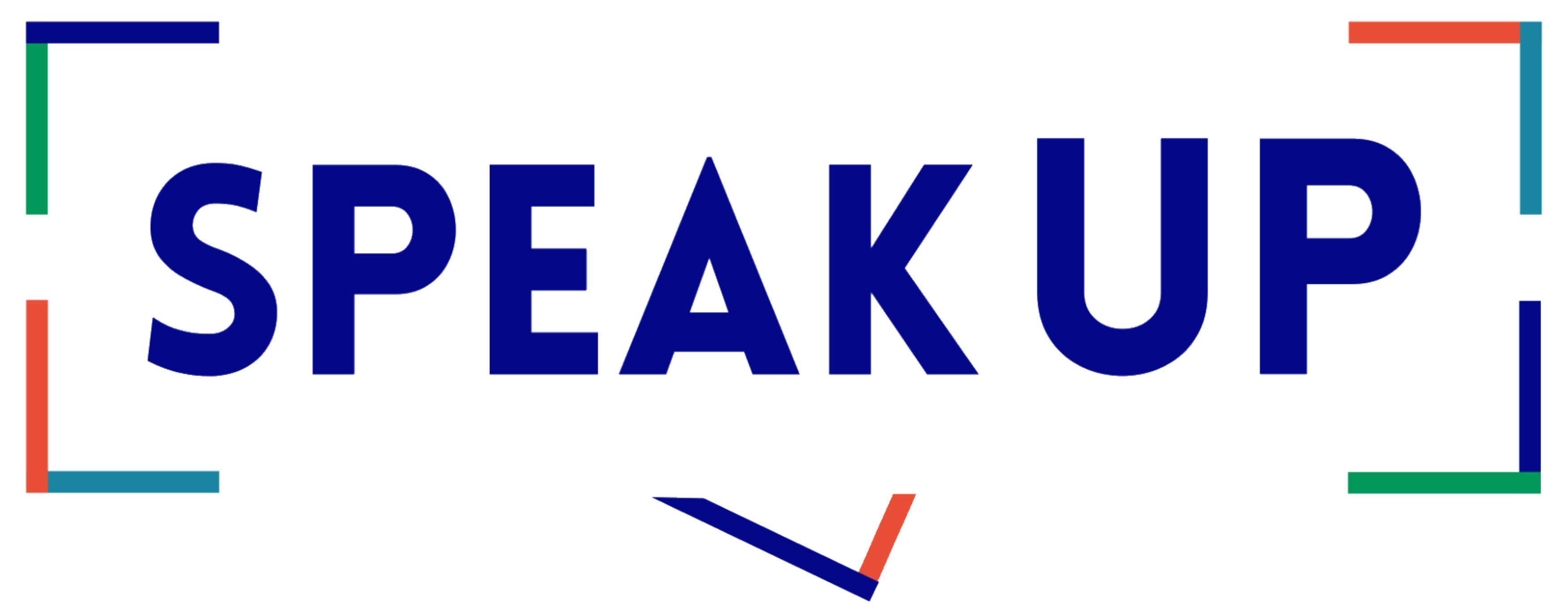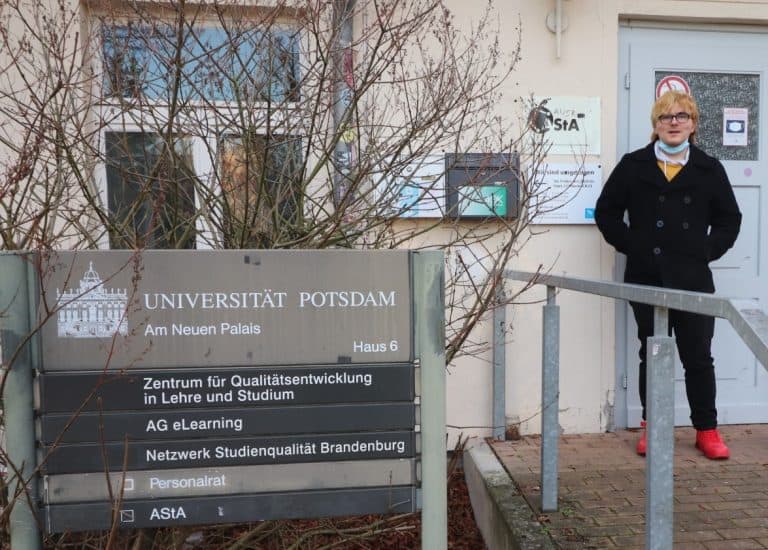Wohnungen für Studierende: Mangelware in Potsdam und deutschlandweit | Dorms for students: a scarce good in Potsdam and throughout the country
Alle Jahre wieder… merken Studierende wie groß die Wohnungsnot ist. Der aktuelle soziale Wohnungsmarkts zeigt, dass deutlich mehr Wohnraum für Student:innen notwendig ist. Ein kurzer Stand über die missliche Lage.
Von Hannah Mück.
Jedes Semester stellen sich neu nach Potsdam ziehende oder innerorts umziehende Studierende ganz hinten in der Reihe an, um auf einen bezahlbaren Platz in einem öffentlich-rechtlichen Studierendenwohnheim zu hoffen. Die Freude ist natürlich groß, wenn man sehr spontan ein oder zwei Monate vor Semesterbeginn eine Wohnung ergattert. Das funktioniert meist nur dann, wenn man sich circa ein Jahr vorher auf den Platz beworben hat – danach stehen die Chancen eher schlecht.
Die im BAföG festgelegte Wohnpauschaule von 250€ pro Monat reicht außerdem in den allermeisten Fällen nie für die Mietkosten. Deswegen sind Alternativen wie private Wohnheime, eine eigene Wohnung oder ein Wohnort außerhalb von Grund auf schwierig und Student:innen, ohne großen finanziellen Rückhalt nicht zuzumuten. Sozial gerecht oder chancengleich ist die Aufnahme eines Studiums also leider gar nicht.
Wohnungsnot vor Ort
Gebaut wird zwar gerade viel in Potsdam, die Frage ist nur für wen und mit welchen Einkommen. Während die Zahl der Studierenden immer weiter steigt, zieht die Anzahl der dafür benötigten Wohnungen keineswegs mit. Das Studentenwerk Potsdam erklärt selbst, dass bei mehr als 30.000 Studierenden in Potsdam, Wildau und Brandenburg an der Havel nur 2.833 öffentlich-rechtliche Wohnheimplätze zur Verfügung stehen. Damit kommen gerade einmal 9% aller Studierenden in bezahlbaren Wohnungen unter. Übrigens liegt die Quote auch bundesweit bei nicht einmal 10% – ein beklagenswerter Zustand.
Was wird gemacht?

Deutschlandweit fordern die Studentenwerke bereits seit 2018 einen Hochschulsozialpakt von Bund und Ländern mit einer Summe von 2,25 Milliarden Euro für Bau und Sanierung von Mensen und 25.000 zusätzlichen Wohnheimplätzen. Für energetische Sanierung sieht der Hochschulsozialpakt 250 Millionen Euro vor. Grundsätzlich sind die Bundesländer dafür zuständig, der Bund kann sich aber, wenn der Wille der Fraktionen da wäre, auch finanziell daran beteiligen.
Auf Bitte zur Stellungnahme des Deutschen Studentenwerks (DSW) zum Hochschulsozialpakt kamen vor der Bundestagswahl dieses Jahr größtenteils vielversprechend klingende Antworten von tausenden neuen Wohnheimplätzen. Was sowohl die neue Bundes- als auch die brandenburgische Landesregierung vom Hochschulsozialpakt tatsächlichen umsetzen wollen und werden, bleibt offen.
Dass Hochschulpolitik mit allem was dazu gehört, von ausreichend Lehrpersonal, modernen Gebäuden und Wohnungen, über finanzielle Unterstützung, bis hin zu einem gleichrangigen Stellenwert mit anderen Bildungseinrichtungen, konkret Schulen während der Pandemie, gerne hinten ansteht, ist leider nichts Neues.
Und nun?
Die konkrete Frage ist ja, ob Studierende in (naher) Zukunft nicht nur auf eine bezahlbare Wohnung hoffen müssen, sondern ob sie einen Wohnraum ohne zu großes Bangen fest einplanen können.
Das DSW erklärt auf Nachfrage, dass sich leider in jüngster Zeit nicht viel in Brandenburg getan hat. „Das größte Bauvorhaben hat derzeit das Studentenwerk Potsdam auf dem Campus Golm der Universität Potsdam; dort sollen 350 neue Wohnheimplätze entstehen“ (DSW). Dieser Neubau ist aber leider auch nicht ganz unproblematisch, mehr dazu in diesem speakUP Artikel.
Fazit ist: Wer in eine Wohnung im Wohnheim ziehen möchte, sollte sich auch zukünftig so schnell wie möglich darauf bewerben. Ansonsten wird’s teuer.
— ENGLISH VERSION —
Dorms for students: a scarce good in Potsdam and throughout the country.
Year after year students face the housing shortage in Potsdam. The current numbers depicting the shortage only leave hope that the ones responsible for this will solve the problem. A short update on the housing problem.
By Hannah Mück.
Some time before every new semester starts, students moving to Potsdam, or the ones moving in the city must put themselves on the long waiting list to get an affordable dorm in one of the public student residencies. Of course, there is a huge joy when you get accepted on quite short notice about a month or two before the semester already begins. This usually only happens when you had applied about a year in advance – anything later than that and your chances will be small.
In the BAFöG, there is a flat rate of 250€ for your dorm each month. This rarely covers the rent, cheapest flats in Potsdam and Berlin start at about 300€/month, many others cost twice as much. This way, alternatives like living in private student residencies, an own flat, or in a village outside of Potsdam are unreasonable for students without financial support e.g., from their parents. If one can’t even afford a flat in the university city, you can’t actually call it social justice or equal opportunity for everyone to enroll at university and get a degree.
Housing shortage in Potsdam
As you may have noticed, there are many construction sites for new flats in Potsdam. The question is for who and for what salaries they are build. While the number of students is increasing immensely over time, the number of affordable flats for students doesn’t keep up. The “Studentenwerk Potsdam” (Student Service Potsdam) states that even though there are more than 30.000 students in Potsdam, Wildau, and Brandenburg an der Havel at the moment, there are only 2.833 public dorms. This equals 9% of students, a tiny percentage. Besides, the average in Germany also isn’t higher than 10%.
Is there any progress?

Across the country, Studentenwerke have been demanding a so-called “Hochschulsozialpakt”, which is a treaty for more social and mainly financial supporting university politics, since 2018. In this agreement, they request 2.25 billion euros for new construction and renovation of canteens and 25.000 student flats. Additionally, they demand 250 million euros for energetic renovation. Basically the federal states are responsible for politics concerning universities. However, the federation could get on board with financial aid – if it wanted to.
After the Deutsche Studentenwerk (the student service organisation for the whole country) had asked the political parties about their take on the “Hochschulsozialpakt” before the election in September, most of them were all in for thousands of new dorms for students in Germany. It’s still open if and what part of the „Hochschulsozialpakt“ will be realised by the government of Brandenburg and the federal republic.
It’s nothing new that higher education politics have been neglected for quite some time now. The insufficient number of lecturers, old-fashioned uni buildings and dorm capacities, too little financial aid for students as well as unis, let alone the instant closing of unis during the pandemic that is especially interesting when you compare them to schools which enjoy a much higher priority etc. The list goes on.
A look into the future
The question now is whether students have to hope and pray to get a flat in a public student residency or if they can securely include an affordable flat when planning to move for their studies.
The DSW has stated that unfortunately, not a lot has happened in the state of Brandenburg recently. „The biggest construction project is by the Studentenwerk Potsdam on Campus Golm; 350 new rooms shall emerge there“ (DSW). Why this isn’t quite unproblematic, you can find out in this speakUP article.
The bottom line is: anyone wishing to move into a public student flat should still apply as soon as possible. Otherwise, living will get expensive quick.



